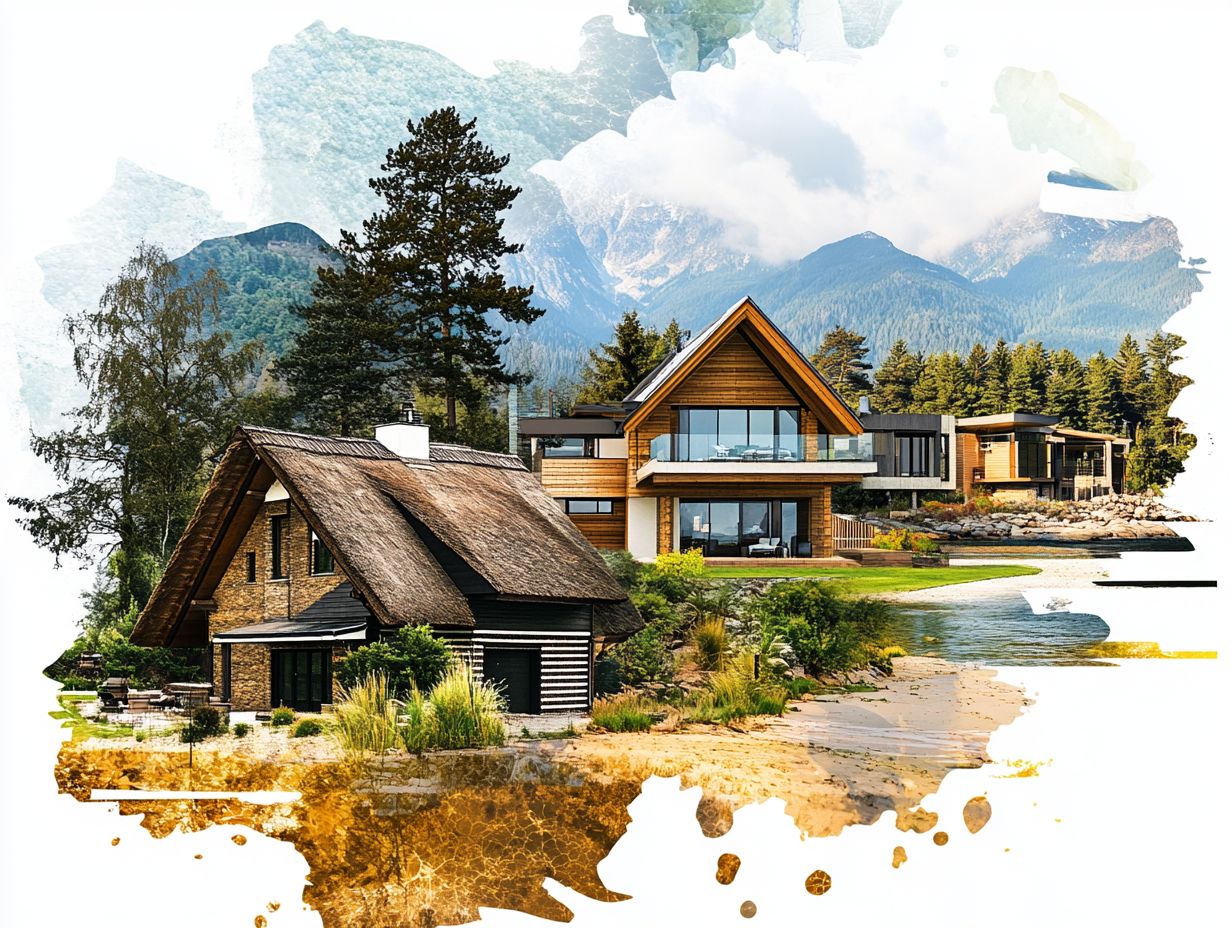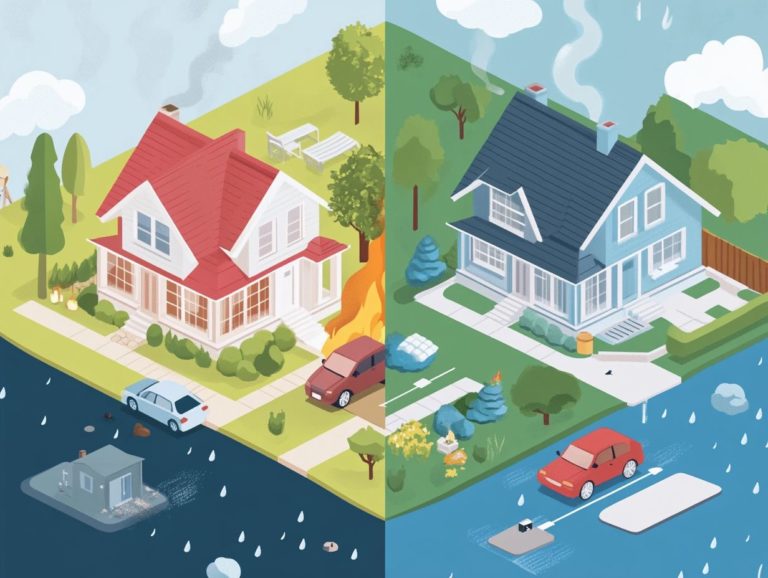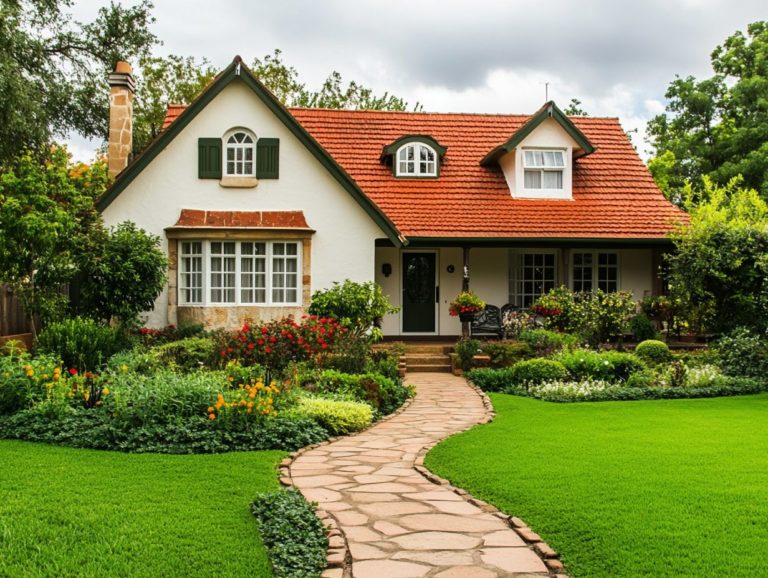5 Types of Home Insurance for Unique Properties
Navigating the world of home insurance can feel overwhelming, especially when your property doesn t conform to traditional standards.
Whether you own a high-value home, a mobile property, or a condominium, each type of insurance comes with specific considerations that you need to keep in mind.
This article delves into five essential types of home insurance designed for unique properties, highlighting what sets each one apart.
You’ll also discover the factors that influence your insurance needs, how to identify the best coverage for your situation, and tips for saving on premiums.
Join in as we demystify the intricacies of home insurance for distinctive properties, ensuring you re fully equipped to protect your investment.
Contents
- Key Takeaways:
- 1. High-Value Home Insurance
- 2. Flood Insurance
- 3. Earthquake Insurance
- 4. Condominium Insurance
- 5. Mobile Home Insurance
- What Makes These Types of Home Insurance Different?
- What Factors Affect What Type of Home Insurance You Need?
- How Can Homeowners Determine the Best Type of Insurance for Their Property?
- What Are the Benefits of Having Specific Types of Home Insurance?
- What Are the Risks of Not Having Adequate Insurance for Unique Properties?
- How Can Homeowners Save on Insurance for Unique Properties?
- Frequently Asked Questions
- What are the 5 types of home insurance available for unique properties?
- What is high-value home insurance and who needs it?
- Is vacant home insurance necessary for properties that are not lived in year-round?
- What makes a property eligible for historic home insurance?
- Do mobile homes require a specific type of insurance?
- Why is flood insurance recommended for unique properties?
Key Takeaways:

High-value home insurance provides comprehensive coverage for luxury homes and their unique features.
Flood and earthquake insurance protect against natural disasters not typically covered by standard policies.
Condominium and mobile home insurance offer tailored coverage for these unique types of properties.
1. High-Value Home Insurance
High-value home insurance is crafted specifically for homeowners like you who own properties valued well above the average market price.
This type of insurance offers tailored coverage options that ensure comprehensive protection against a variety of potential risks.
With features like extended dwelling coverage and personal liability, it serves as an essential financial safety net for your high-value property.
Policies such as HO-5 are particularly noteworthy. They provide broader coverage, protecting you against a range of risks that standard plans might miss.
This insurance often covers high-end art collections, luxury vehicles, and designer furnishings, recognizing that standard policies may fall short when it comes to the unique aspects of luxury living.
Get expert guidance tailored to your needs by collaborating with specialized insurance agencies. Obtaining personalized quotes allows you to find coverage that perfectly aligns with your aspirations and lifestyle.
Enjoy the peace of mind you deserve in your investments.
2. Flood Insurance
Flood insurance is an essential pillar of your homeowners insurance strategy, carefully designed to safeguard you against significant risks posed by flooding risks that often slip through the cracks of standard insurance policies.
Think of this insurance as your financial safety net, allowing you to recover from property damage inflicted by floods, which can severely affect your home and cherished belongings.
Familiarizing yourself with the various types of flood insurance coverage, such as structural protection and personal property coverage, enables you to make informed decisions that align with your unique circumstances.
Understanding the claims process after a flood is crucial; timely reporting and thorough documentation can significantly impact the outcome of your claim.
Taking the time to compare quotes from multiple providers gives you the power to secure the best rates and terms, ensuring you select a policy that meets both your financial and coverage needs.
Incorporating flood insurance into your strategy grants you peace of mind, knowing you re protected against unforeseen natural disasters.
3. Earthquake Insurance
Earthquake insurance is an essential safeguard for you as a homeowner in seismic zones. It offers specialized coverage that addresses the unique risks posed by earthquakes risks often excluded from standard homeowners insurance policies.
This type of coverage acts as a financial safety net, ensuring you are protected against significant property damage and loss of personal belongings due to seismic activity.
Understanding the specific risks in your area, such as the shaking of the ground during an earthquake and potential landslides, can greatly influence your decision to obtain this insurance.
What It Covers
- Rebuilding costs
- Loss of use
- Damages to personal property
It s worthwhile to consult companies that specialize in earthquake insurance, as they often provide tailored policies that align with your region s seismic history.
The process for filing a claim can vary significantly, so it s crucial for you to familiarize yourself with policy details and maintain organized documentation after an event.
Ensure a smooth claims experience by being prepared.
Protect your unique property today! Reach out to an insurance expert for personalized advice.
4. Condominium Insurance

Condominium insurance, also known as an HO-6 policy, is specifically designed for condo owners. This policy helps protect your personal belongings and improvements that aren’t covered by your homeowners association’s master policy.
This specialized insurance addresses unique risks of condo living, such as property damage to your items and costs shared among condo owners for unexpected events.
Understanding the differences between condominium insurance and traditional homeowners insurance is crucial. While homeowners insurance generally covers both the dwelling and personal property, the HO-6 policy focuses on the interiors, protecting your possessions and enhancements that the master policy might miss.
Loss assessment coverage is vital, as it safeguards you against community costs that may arise from unexpected events. Your homeowners association manages the master policy, which may not account for every possible scenario.
Don t leave your investment to chance choose the right insurance for peace of mind within your community.
5. Mobile Home Insurance
Mobile home insurance is a specialized type of homeowners insurance crafted for mobile or manufactured homes. It provides critical coverage tailored to the unique risks associated with these dwellings, including property damage and personal liability.
This policy typically includes essential features like dwelling coverage and options for insurance riders, ensuring you have a solid financial safety net when the unexpected occurs. Unlike traditional homeowners insurance, mobile home insurance covers the unique risks of mobile homes, especially their exposure to severe weather.
Personal liability coverage is particularly vital; it protects you against legal claims arising from injuries or damages, granting you invaluable peace of mind. You can choose different insurance riders to cover valuable items or specific risks, enhancing your overall protection.
When comparing mobile home insurance quotes, take the time to evaluate coverage limits, deductibles, and customer reviews to secure the best fit for your unique circumstances.
What Makes These Types of Home Insurance Different?
Exploring the various types of home insurance reveals a range of options, including the top 5 types of home insurance policies, each designed to meet specific needs and risks associated with different types of properties and locations.
You’ll find high-value home insurance, flood insurance, earthquake insurance, condominium insurance, and mobile home insurance, each with distinct features.
Diving deeper into each option uncovers unique characteristics designed to mitigate specific threats. For example, types of home insurance for first-time buyers can provide coverage that exceeds standard limits, ensuring that your luxury possessions are well protected.
Flood insurance offers crucial financial support for properties in flood-prone areas, addressing the increasing risks posed by climate change.
Earthquake insurance is essential if you live in a seismic zone, providing vital protection against potential devastation. If you reside in a condominium, customized insurance considers shared spaces and unique structural features.
Mobile home insurance, on the other hand, addresses a different set of vulnerabilities specific to these types of homes.
It s vital that homeowners thoroughly assess property values to establish appropriate coverage limits, as this directly affects the effectiveness of the policy.
Therefore, making informed comparisons of insurance options is essential to find a policy that balances adequate coverage and affordability.
What Factors Affect What Type of Home Insurance You Need?
Several key factors affect what type of home insurance you need, including your geographical location, the type of property you own, and the specific risks associated with high-risk homes. These homes are more vulnerable to natural disasters and property damage.
It’s essential to evaluate these elements. This helps pinpoint your unique insurance requirements and tailor your coverage to ensure sufficient protection against potential threats.
For example, if you live near flood zones, specialized flood insurance is a must-have. If you’re in an earthquake-prone area, you may need extra coverage that specifically addresses seismic risks.
The type of property you have whether it s a single-family home, a condominium, or a rental unit also influences the insurance you ll require. The construction materials of your home also play a crucial role. Homes built from wood face different risks compared to those made from brick or stone.
To accurately assess your risk, conduct thorough inspections of your property and consult local hazard maps, which are maps that show potential risks in your area. These resources offer crucial insights to help you determine the most appropriate insurance coverage for your needs.
How Can Homeowners Determine the Best Type of Insurance for Their Property?

You can determine the best type of insurance for your property by conducting a thorough assessment of your specific needs, evaluating coverage options, and consulting with experienced insurance agents who can provide valuable insights and tailored quotes.
This comprehensive approach ensures that you select the most suitable policy that aligns with your property’s unique characteristics and potential risks.
To start, assess the current market value of your property, as this lays the groundwork for adequate coverage. Understanding the unique risks your location may pose like natural disasters or crime rates will further inform your decisions.
Gather multiple estimates from different insurers and compare not just premiums but also coverage specifics and exclusions.
Consulting with insurance professionals can offer clarity, helping you navigate complex terms and ensuring that your policy effectively meets your evolving needs.
What Are the Benefits of Having Specific Types of Home Insurance?
Choosing specific types of home insurance brings many benefits. You receive tailored coverage that protects you from unique risks, the peace of mind that comes from having a reliable financial safety net, and a streamlined claims process designed to meet your property’s specific needs.
By understanding these advantages, you empower yourself to make informed decisions about your insurance coverage.
Take, for example, a homeowner in a flood-prone area who chose a policy designed specifically for flood damage. When a severe storm struck, that decision proved invaluable. The homeowner was able to recover financially, receiving funds for repairs and restoration quickly thanks to an efficient claims process.
In another scenario, consider a family with valuable assets that benefited from a specialized policy covering art and collectibles. When an unexpected fire occurred, this tailored coverage prevented a potential financial disaster.
These examples illustrate how choosing specific types of home insurance can serve not only as a safety net but also as a strategic choice for long-term stability.
What Are the Risks of Not Having Adequate Insurance for Unique Properties?
Not having adequate insurance for unique properties presents significant risks. You may face high costs if property damage, natural disasters, or liability claims exceed your insurance coverage limits, jeopardizing your financial safety net.
Understanding these risks helps you protect your valuable assets effectively. Imagine a homeowner in a flood-prone area who realizes too late that their standard policy doesn t cover water damage.
After a devastating storm, they could end up staring down thousands of dollars in repairs, wholly unprepared for that burden. Now think about another homeowner with an exotic property who might overlook specific threats like earthquakes or fire risks.
When disaster strikes, the consequences could be severe and costly. By understanding the unique risks tied to your property and opting for tailored insurance policies, you can better safeguard yourself against these challenges, ensuring your financial stability remains secure.
How Can Homeowners Save on Insurance for Unique Properties?
You can save on insurance for your unique property by exploring various strategies. Start by looking for available insurance discounts and optimizing your policies with your insurance agent.
Implementing security features can lower your risk profile, often leading to reduced premiums. By effectively leveraging these strategies, you can maintain adequate coverage while minimizing insurance costs.
One savvy approach is bundling multiple policies, like home and auto insurance, which typically results in substantial discounts. Enhancing your home s safety with measures such as installing a security system or smoke alarms not only lowers your risk but can also attract additional savings.
Engaging in proactive communication with your insurance agent is key. Discuss your specific needs and ask about lesser-known discounts or potential rate reductions that may apply to you.
Gathering quotes from various providers and comparing them helps you make a well-informed decision that balances coverage with cost, ultimately contributing to your financial peace of mind.
Frequently Asked Questions

What are the 5 types of home insurance available for unique properties?
The 5 types of home insurance for unique properties include high-value home insurance, vacant home insurance, historic home insurance, mobile home insurance, and flood insurance.
What is high-value home insurance and who needs it?
High-value home insurance provides coverage for expensive or luxury properties that may not be adequately covered by standard home insurance. Homeowners with high-value homes, such as those with custom features or high-end materials, may need this type of insurance.
Is vacant home insurance necessary for properties that are not lived in year-round?
Yes, vacant home insurance is important for properties that are unoccupied for long periods. This coverage protects against risks like vandalism, theft, and damage from natural disasters.
What makes a property eligible for historic home insurance?
Historic home insurance is designed for properties with historical or architectural significance. These properties often require specialized home insurance policies to protect against damage to unique features or restoration costs.
Do mobile homes require a specific type of insurance?
Yes, mobile homes need specialized insurance coverage due to their unique construction and potential for transportation. Mobile home insurance can cover both the structure and personal belongings inside the home.
Why is flood insurance recommended for unique properties?
Flood insurance is recommended for unique properties because it provides coverage for damage caused by floods, which are typically not covered by standard home insurance. For more information on this, understanding homeowners insurance types is essential, especially since unique properties may have features that are more vulnerable to water damage, making this coverage crucial.
Don’t wait until disaster strikes assess your insurance needs today!






